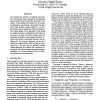1347 search results - page 34 / 270 » An Approach to Software Evolution Based on Semantic Change |
105
click to vote
MSR
2005
ACM
15 years 7 months ago
2005
ACM
Refactoring is one means of improving the structure of existing software. Locations for the application of refactoring are often based on subjective perceptions such as ”bad sme...
108
click to vote
OMER
2001
15 years 2 months ago
2001
Abstract: Modeling of modern production plants often requires that the system provides means to cope with frequent changes in topology and equipment and can easily be adapted to ne...
133
click to vote
IJCAI
2003
15 years 2 months ago
2003
We consider the problem of updating nonmonotonic knowledge bases represented by epistemic logic programs where disjunctive information and notions of knowledge and beliefs can be ...
109
click to vote
ICSM
1999
IEEE
15 years 5 months ago
1999
IEEE
The success of an object-oriented software development project highly depends on how well the designers can capture the Hot Spots of the application domain, that is, those aspects...
115
click to vote
CORR
2010
Springer
15 years 1 months ago
2010
Springer
Ontologies such as taxonomies, product catalogs or web directories are heavily used and hence evolve frequently to meet new requirements or to better reflect the current instance d...

